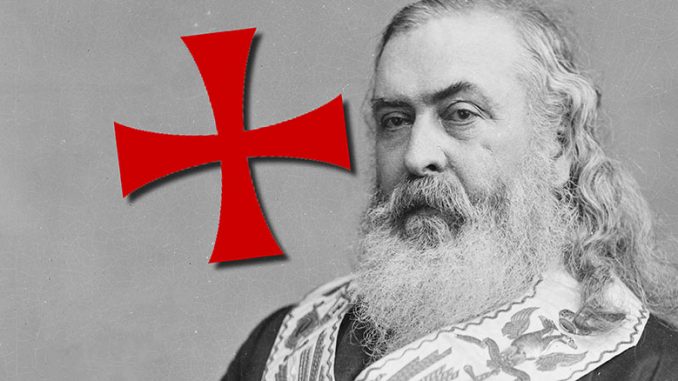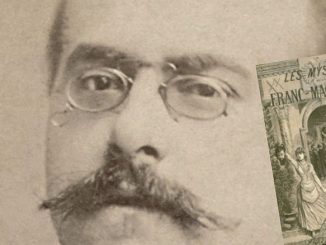
Templarism by Albert Pike
Seven centuries and a half have passed away since, in 1118 eight French noblemen, uniting themselves into a society, became the Master and Brethren of the Temple. They first displayed the red cross upon the field in 1148; were almost annihilated in storming Ascalon in 1153; their principles were confirmed by the Bull Omne Datum Optimum, in 1139 and they fought the great battle of Tiberias in 1187, in which year the Holy City of Jerusalem surrendered to the Infidels. Other crusades were preached, and the soldiery of the Temple fought in the Holy Land until the end of the thirteenth century, by the side, in succession, of Richard Lion-heart of England, and Philip Augustus of France; of Saint Louis and Edward Prince of Wales, at Damietta, Gaza, and Acre; and wherever a blow was to be struck for the Cross against the Crescent.
On the 13th of October, 1307, all the Templars in France were arrested, and on the 18th of March, 1314, the Grand Master was burned. Princes had been members of the Order, and its ambassadors had taken precedence of Christian kings. It had become too powerful by numbers, and wealth, and connections, and it sought to be more powerful still by its influence upon opinions. In the East, the home of Gnosticism, and where the doctrines of Saint John the Apostle were still supreme; in that Asia Minor of the seven churches, to which Paul, the new apostle, contested the claims of Peter to the pontificate of the Gentile church; in that Orient, of which Patmos, the apocalyptic isle, was a part; the Templars had learned doctrines not acceptable to the Roman bishops, and it is probable that some of them had accepted those of Manes, and were liable to the pains and penalties denounced against heretics.
To the monarchs of Christendom, all of whom were at that day little more than the deans of the nobility, maintaining a constant struggle against the ambition of their vassals, insecure in their places of power, and without standing armies, the soldiery of the Temple had become a terror by their numbers, their immense possessions, and their unity of organization. For the Order dreamed of an Oriental empire, and sought to obtain, by negotiation, an eastern seaport. It was a standing army of proud, fiery, indomitable warriors, distributed over all Europe, and obedient to the single will of the Grand Master. The thrones and the altars combined against it, and it fell and disappeared in a day. Its pride, ambition, and luxuries, swelled the provocations that caused its ruin. During the centuries that followed, while it was merged in other orders, and wore the mask of Freemasonry, it was, as is usual, chastened and purified by adversity. The advances made by science, the revival of letters, the reopening of the treasures of the ancient Grecian and Oriental wisdom, gave it a deeper and a sounder philosophical doctrine, and a wiser and truer religious creed; and its hereditary desire for vengeance on the despotisms to which its ruin was due, symbolized by the mitre and the crown, led it eagerly to adopt the idea that governments are made for the people, and not the people for governments, upon its first announcement to the world.
If our Order of Templarism should again become prosperous and powerful, let it avoid the shoals upon which it once suffered shipwreck. Let it become neither haughty, nor vainglorious, nor luxurious, nor useless. The principles which it adopted in adversity, let it adhere to in its better fortunes. Let the enlargement of the Order, and the increase of its members and its Commanderies, be the enlargement of its powers and the confirmation of its desires to benefit mankind, strengthen its hands against all unrighteous usurpation of power by kings, or pontiffs, or popular chiefs, military or civil, and encourage us to hope for the final triumph of liberty, equality, and fraternity, in the sense in which these are understood by the true Freemasonry.
Let us also remember, in striving to benefit our race, that the multitude is in every country instinctive rather than reflective, and can be attached to ideas only by means of forms, and surrenders its prejudices and changes its habits with difficulty. Popular assemblies are not swayed by reason, and legislative majorities are little controlled by any sense of justice. Upon an attempt to combat superstitions, it always seems to the people that religion itself is assailed. Socrates was accused of Atheism before the tribunals; and Jesus was denounced to the authorities as a blasphemer. Wherefore, those that undertake reforms will be wise, if, like Saint Gregory, one of the greatest among the Popes, they do not permit usages to be suppressed. “Purify the temples,” he wrote to his missionaries, “but do not destroy them; for so long as the nation shall see its ancient places of prayer standing, it will repair thither by habit, and you will, with the more ease, persuade it to the worship of the true God.”
Society has not no right to consider itself enlightened while it regards the abuses of a system as its excellencies, and makes idols of its own prejudices, and looks with horror on attempts to obtain rational reforms as revolutionary projects; nor, while it continues to be ignorant that the criminal instincts are the most frightful of all the mental maladies, and does not comprehend that the disease should be cured, and not put to death, has it any right to consider itself Christian.
Keep these truths always in view in the warfare which you are incessantly to wage against tyrannies. For there are not only tyrannies of thrones and pontificates, but of the people, and parties, and opinion, and of the law. Close around you everywhere you will find evils enough to combat, and it will be well for you if you do not become their ally.
The days have retired but a little way into the past when men were divided into but two classes – the oppressor and oppressed. Then thought was imprisoned; to breathe it was peril, if not death; and it died in the brain where it was born, or was only whispered in the solitude. The obligations of Blue Masonry are retained, that they may incessantly remind us of those wretched days. Now, thought is free as the wind, and the lightning flashes it across the oceans and around the continents. Nations are enfranchised by it, and the golden glories of truth begin to illumine the world. A new power has arisen among men, known as public opinion, with a new weapon – the press. Before it, even the kings recede, and yield to it, and obey its bulb and allocutions, or it shakes down their thrones into the dust.
We should be but cravens, therefore, if we did not persevere. Whatever the evils of to-day in the country in which we live, they are not invincible; for they are neither necessary and inevitable, nor in their nature immortal. Neither are we powerless in the struggle against them, and we are no true knights if we yield to discouragement:
“The smallest effort is not lost;
Each wavelet on the ocean tossed
Aids in the ebb-tide or the flow;
Each rain-drop helps
some flower to blow,
Each struggle lessens human woe.”
About Us
We hope you enjoyed this article on Templarism.
TemplarHistory.com was started in the fall of 1997 by Stephen Dafoe, a Canadian author who has written several books on the Templars and related subjects.
Read more like this article on Templarism from our Modern Templars Archives – Templar History
Templarism – It’s Sphere and Duty.



